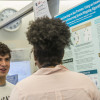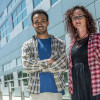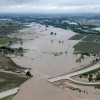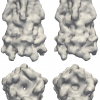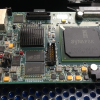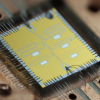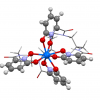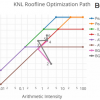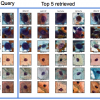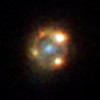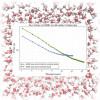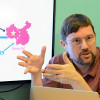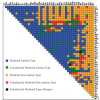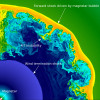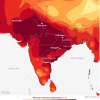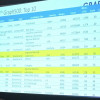News Center
Students, Faculty Head Back to School, but a Few Staying On at CRD
Their posters rolled up after a lively Aug. 3 presentation session, nearly all of the students and guest faculty working in the Berkeley Lab Computing Sciences area are now back home, starting the new school year. But Rafael Zamora and Tom Corcoran from Hood College had their stays extended as they apply deep learning to classify specific protein structures that could lead to more effective drugs for fighting cancer. Read More »
CRD’s Internship Impact: From Berkeley Lab Cubicles to Television
Last month, CRD’s Daniela Ushizima was an invited guest on the Brazilian television program “Questao de Ordem” where she talked about her work on the analysis of microscopic images. Read More »
Targeting Better Cancer Drugs through Berkeley Lab Partnership
Sally Ellingson and Derek Jones of the University of Kentucky, Lexington, spent the summer working in CRD to use machine learning to enhance a model for predicting how drugs will bind to specific proteins. Read More »
Berkeley’s Lin Lin Receives 2017 DOE Early Career Award
Lin Lin, a faculty scientist in Berkeley Lab’s Computational Research Division and an assistant professor in UC Berkeley’s Mathematics Department, has received a 2017 Early Career Research Program award from the Department of Energy’s Office of Science. Read More »
CRD’s Pazner Wins First-Place in AIAA Aviation Forum’s Student Paper Competition
Will Pazner, a graduate student researcher in CRD’s Mathematics Group won first place in the computational fluid dynamics category of a student paper competition hosted by the 2017 American Institute of Aeronautics and Astronautics (AIAA) Aviation Forum. Read More »
“Hindcasting” Study Investigates the Extreme 2013 Colorado Flood
Using a publicly available Weather Research and Forecasting regional model, Berkeley Lab researchers “hindcast” the conditions that led to the Sept. 9-16, 2013 flooding around Boulder, Colo. and found that climate change attributed to human activity made the storm much more severe than would otherwise have occurred. Read More »
New Data Archive Aims to Amplify Impact of Ecosystem Research
Berkeley Lab’s Computing Sciences and Earth & Environmental Sciences Area are partnering on a three-year project to develop an archive that will serve as a repository for hundreds of DOE-funded research projects under the agency’s Environmental System Science umbrella. Read More »
New Berkeley Lab Algorithms Extract Biological Structure from Limited Data
A new Berkeley Lab algorithmic framework called multi-tiered iterative phasing (M-TIP) utilizes advanced mathematical techniques to determine 3D molecular structure of important nanoobjects like proteins and viruses from very sparse sets of noisy, single-particle data. Read More »
Will Brain-Inspired Chips Make a Dent in Science’s Big Data Problems?
Although neuromorphic computing is still in its infancy, researchers in Berkeley Lab's CRD hope that these tiny, low-power, brain-inspired computing systems could one day help alleviate some of science’s big data challenges. Read More »
Erich Strohmaier Named ISC 2017 Conference Fellow
The ISC High Performance conference (ISC 2017) named Berkeley Lab’s Eric Strohmaier an ISC Fellow. Strohmaier is known internationally for his role as a founding editor of the twice-yearly TOP500 list of the world’s top supercomputers. Read More »
Record-breaking 45-qubit Quantum Computing Simulation Run at NERSC
Researchers from ETH Zurich in Switzerland used the Cori supercomputer at NERSC to simulate a 45-qubit circuit, the largest simulation of a quantum computer ever achieved. They also used CRD's Roofline Model to improve code performance. Read More »
A Fresh Math Perspective Opens New Possibilities for Computational Chemistry
A new mathematical “shortcut” developed by Berkeley Lab researchers is speeding up molecular absorption calculations by a factor of five, so simulations that used to take 10 to 15 hours to compute can now be done in approximately 2.5 hours. These algorithms will be incorporated in an upcoming release of the widely used NWChem computational chemistry software suite later this year. Read More »
Roofline Model Boosts Code Optimization on Manycore Systems
A software toolkit developed in Berkeley Lab's Computational Research Division to better understand supercomputer performance is now being used to boost application performance for researchers running codes on manycore supercomputers at NERSC and other supercomputing facilities. Read More »
C3 Graduate Student Researcher Wins 2017 Berkeley Trumpler Award
Danny Goldstein, a Berkeley Lab Graduate Student Researcher in CRD’s Computational Cosmology Center, has been awarded the Berkeley Trumpler Award for his academic excellence, as well as his outstanding record of involvement in the UC Berkeley Astronomy Department and wider astronomical community. Read More »
Recognition Software Drives Matches across Multiple Science Domains
A team led by Daniela Ushizima of the Computational Research Division has built a Python-based tool for content-based image retrieval (CBIR) capable of searching relevant items from large datasets, given unseen samples. Named “pyCBIR,” the tool can be used to catalog and retrieve images from different science domains, such as biology, materials research and geology. Read More »
CRD’s Scott Beamer Wins SPEC Kaivalya Dixit Distinguished Dissertation Award
Scott Beamer, a post-doc in the Computational Research Division’s Computer Architecture Group, is to receive the 2016 SPEC Kaivalya Dixit Distinguished Dissertation Award at the 8th ACM/SPEC International Conference on Performance Engineering being held April 22-27 in L’Aquila, Italy. Read More »
Rare Supernova Discovery Ushers in New Era for Cosmology
Using an automated supernova-hunting pipeline based at NERSC, astronomers have captured multiple images of a gravitationally lensed Type Ia supernova. This detection is currently the only one of its kind, but astronomers believe that if they can find more, they may be able to measure the rate of the universe’s expansion within four percent accuracy. Fortunately, two Berkeley Lab researchers have a method for identifying more of these events using existing wide-field surveys. Read More »
Former Summer Student Jessica Hatcher Wins Research Award
Berkeley Lab Computing Sciences-sponsored summer student Jessica Hatcher won a first place award for her research poster “Quantitative Structure Activity Relationships (QSAR) for Biological Effects of Synthetic Cathinones” at the 74th Joint Annual Meeting of The National Institute of Science/ Beta Kappa Chi. Hatcher was mentored by CRD's Bert de Jong last summer. Read More »
Berkeley Lab Researchers Make NWChem’s Planewave “Purr” on Intel’s Knights Landing Architectures
Berkeley Lab researchers have successfully added thread-level parallelism on top of MPI-level parallelism in the planewave density functional theory method within the popular software suite NWChem. An important step to ensuring that computational chemists are prepared to compute efficiently on next-generation exascale machines. Read More »
A “VAST” Step Forward in Cyber Security
CRD network researcher Vern Paxson and postdoc Matthias Vallentin are developing VAST, a system that will help forensic security analysts pinpoint how much of an organization’s computer network has been compromised, and where. Read More »
Berkeley’s Lin Lin Awarded 2017 SIAG/CSE Early Career Prize
Berkeley Lab’s Lin Lin has ben honored with a 2017 SIAM Activity Group on Computational Science and Engineering Early Career Prize. The honor is bestowed to one outstanding early career researcher that has made distinguished contributions to the field within seven years of receiving a Ph.D. Read More »
Machine Learning Method Accurately Predicts Metallic Defects
For the first time, researchers at Berkeley Lab have built and trained machine learning algorithms to predict defect behavior in certain intermetallic compounds with high accuracy. This method will accelerate research of new advanced alloys and lightweight new materials for applications spanning automotive to aerospace and much more. Read More »
Simulations Reveal the Invisible Chaos of Superluminous Supernovae
To better understand the physical conditions that create superluminious supernova, astrophysicists are running 2D simulations of these events using supercomputers at NERSC and CRD developed CASTRO code.
Read More »
Simulations Confirm Observations of 2015 India/Pakistan Heat Waves
A paper published December 15 during the American Geophysical Union (AGU) fall meeting in San Francisco points to new evidence of human influence on extreme weather events. Read More »
CRD’s Ibrahim Cracks Graph500 with Precisely Tuned Data-Intensive Algorithms
When the latest version of the Graph 500 list was released Nov. 16 at the SC16 conference, there were two new entries in the top 10, both contributed by Khaled Ibrahim of Berkeley Lab’s Computational Research Division. Read More »









